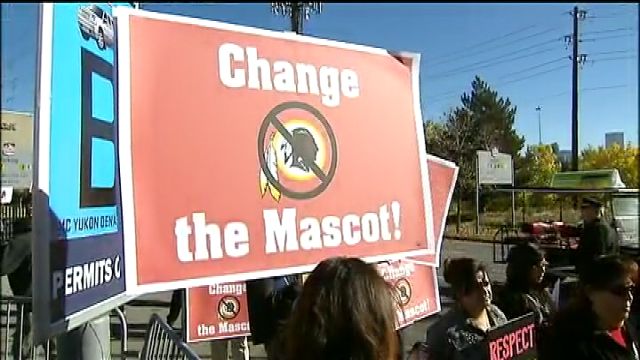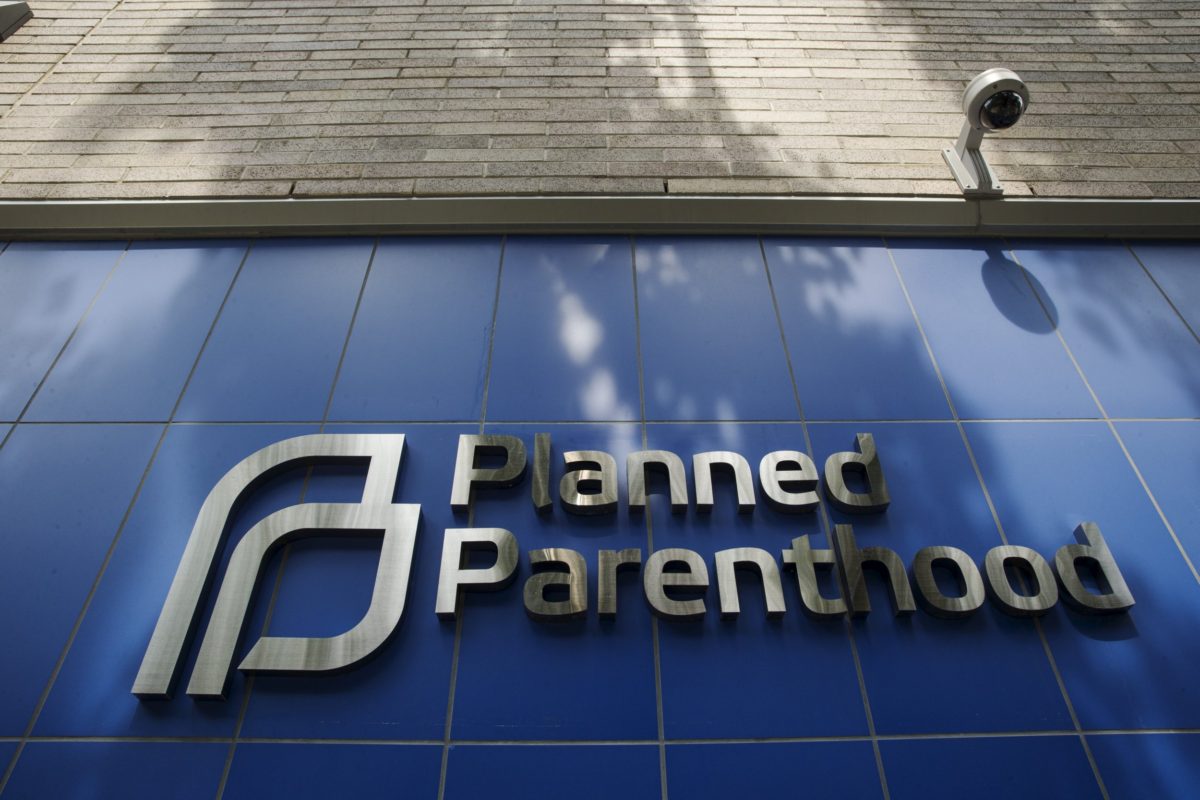This post is part of a week of solidarity between Asian American and Pacific Islander bloggers and Native writers who have spear-headed the #NotYourMascot campaign. For a full list of posts included in the week of solidarity, please check this post.
I’ve been maintaining this blog — a personal and political blog dedicated to Asian American feminism and race activism — for over 12 years. And, in that time, I’ve dedicated my time to try and bring awareness to issues I feel are underaddressed within the Asian American community: mental health, unemployment, reproductive choice, under-education and more. My part-time activism, balanced against a full-time career, has been focused on the goal of challenging racism by dismantling stereotypes of Asian Americans and encouraging my (predominantly Asian American & Pacific Islander (AAPI)) readers to get more politically involved themselves.
Every day, it feels as if there is a new story that could benefit from some air. Every day, I come across a new post yearning to be written — like the distressingly high rates of suicide among Bhutanese Americans — and I feel compelled to write because no one else seems to be talking about it. Every morning, I find myself sifting through a pile of stories to pick the one that could most use some attention; and, when this becomes your daily routine, it’s easy to forget that every story is deserving of attention.
I guess what I’m trying to say is that, as someone who has dedicated the last decade to this unique form of “digital journalism as activism”, it’s easy to get tunnel vision. My Twitter timeline has become a litany of worthy goals and hash-tags, each focused around a despicable example of racism, or sexism, or other kind of discrimination — a depressing deluge of anti-racist action clamouring for visibility, and the details start to bleed into one another. These days, I feel less like I’m pushing back against racism, and more like I’m just treading water.
And, sadly, it is far too easy to become desensitized to it all, and to start to see this list of anti-racist campaigns like just another pile to be sifted through, and to tune out the the individual cries of racial pain, anger, and sadness that echo through the headlines. In short, there is far greater capacity for humanity to treat one another with hatred and intolerance than there is capacity for anti-racist activists to work against it.
So, last week, when a Twitter user asked me why I had thus far been silent on #NotYourMascot — an ongoing multi-year fight to advocate to the NFL the changing of the name of the Washington R*dskins (and associated mascot) — and why it had taken Stephen Colbert’s much-discussed segment likening the team name to the archaic anti-Asian slurs “Oriental” and “Ching Chong Ding Dong”, I responded with a list of reasons. I talked about how the project of the Asian American blogging community is the important one of trying to give air to Asian American issues, and to try and keep together a political identity at constant risk of fracturing. I talked about how I felt over-worked and underpaid (which is to say, I’m still over a thousand dollars in the hole on this blog), how even within a blogosphere of several voices there are still more otherwise unheard Asian American stories to be told than there are people to tell them. I talked about how I felt like I was treading water, even while trying to cover the stories that intersect the very narrow focus of my blog. I talked about how although I supported the #NotYourMascot campaign, I felt obligated to devote my blogging hours to campaigns that didn’t even have the benefit of a hash-tag. I talked also about how, not being Native American, I felt like I didn’t want to subvert another community’s issue with my own clumsy (and potentially ill-informed) thoughts. Finally, I talked about how I’m a boxing fan and not a professional football fan, how I don’t watch Sunday afternoon football, and how until two weeks ago, I thought the Dan Snyder’s team hailed from the state of Washington (guess what, it doesn’t).
And y’know what? All of these reasons are shitty-ass reasons. They’re all human reasons. But they’re also all shitty-ass reasons.
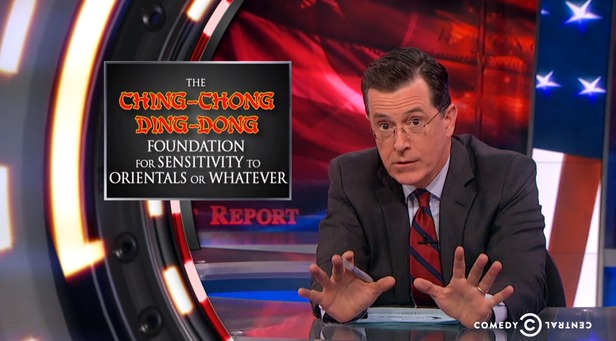
When Stephen Colbert aired his now infamous segment about Dan Snyder’s creation of a philanthropic organization to purchase the forgiveness of Native peoples, it was the tweet and not the segment that raised my hackles. In truth, I have a certain degree of appreciation for Colbert’s televised, satirical segment, which contained Colbert’s invocation of “Oriental” and “Ching Chong Ding Dong”, in context, because of the reaction it triggered in me.
As an Asian American, I still feel an instinctive visceral pain — a figurative gutpunch — every time I hear the word “Oriental”. It engages me on an emotional — not intellectual — level; and as someone who tends to approach anti-racist work from an academic and intellectual vantage point (as my regular readers can surely attest), this sort of periodic emotional reality check can be essential. For me, hearing Colbert parallel the racist anti-Asian history that has targeted my people for centuries with the experiences of Native Americans today was powerful. It forced me to take the gutpunch pain of being reminded of ethnic slurs that have targeted me, my parents, and my people, and to remember that this pain is universal, and that it is happening to many people of all different races, right here, right now.
Writes Jennie Stockle (@IndigeniusIdeas) in a sister post to this one:
Often times words or object imagery that have been associated with our culture, usually stereotypical, are used in conversation to demoralize us. Once I have identified myself as Cherokee, many times, the words peace-pipe, tomahawk, scalping, tipi, “fire water” and other “stereotypical Native iconography” is used. I see similar things happen with other races as well. How many times have you seen watermelons and chicken thrown at black people? How many times have you seen chopsticks and rhyming phrases like “sing-song” hurled at Asian-Americans?
So, yes, the Colbert segment made me racially uncomfortable. But, then it challenged me to remember that my knee-jerk discomfort is what Native peoples are forced to endure every Sunday. The segment challenged me to feel racial discomfort, but then to look outside of my own reaction and to imagine myself in the shoes of someone else.
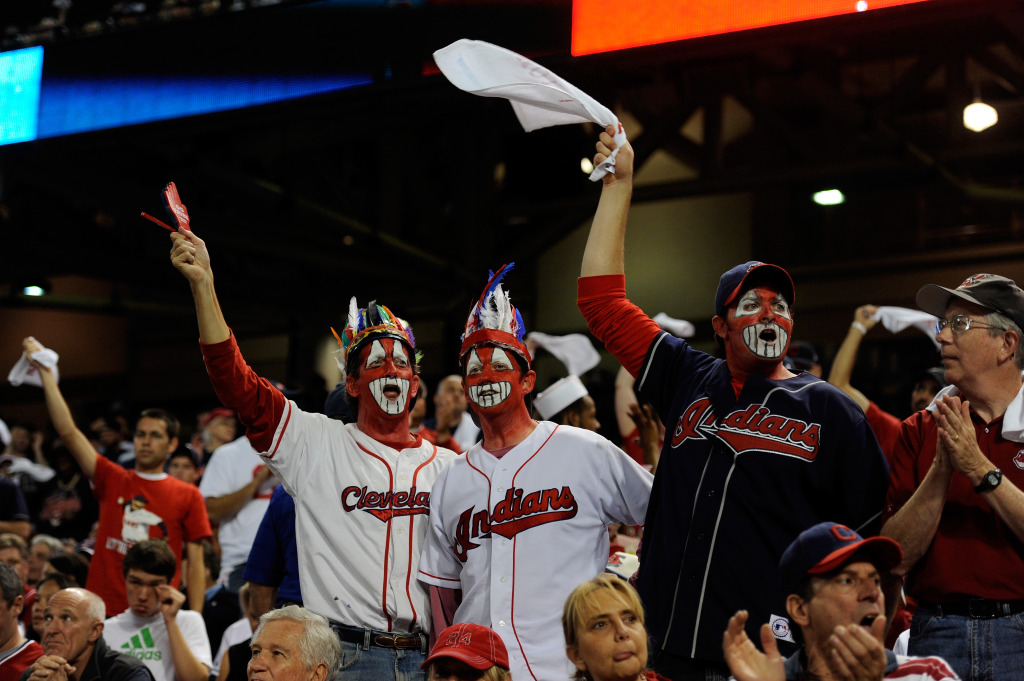
In other words, if Colbert’s intent was to use satire to draw attention to the racism of the Washington R*dskins’ team name and mascot, then it worked. On me.
Ethnic slurs, colour-face, and even superficially “philanthropic” efforts are all tools that have been historically used to maintain and perpetuate the dehumanization of people of colour while upholding the humanity and supremacy of White people. Throughout American history, caricatured depictions of African Americans, Native Americans, and Asian Americans have been popularized in the media of their time to flatten away the humanity of racial minorities; and while the details of these caricatures might differ — the stoic, face-painted, feathered chieftain in blistering red-face or the simpering rat-eating, queued Johnny Chinaman in yellowface — in all cases, the portrait serves as a rationalization for the simultaneous mistreatment, abuse, imprisonment, or even genocide of people of colour.
For most people of colour, the use of colour-face caricatures have given way to more subtle stereotypes. For Asian Americans, we are no longer subjected to the buck-toothed, yellow-skinned alien that graced the propaganda World War II posters, nor are we still forced to endure White actors wearing dental floss taped to their eyes to mimic the Asiatic eye. While instances of yellowface still occur, the stereotypes we face in mainstream pop culture are these days more subtle — the dragon lady, the lotus blossom, the martial artist, the geek. Yet, all Asian Americans should intuitively understand the damage that more overt racial stereotypes and caricatures can have on communities of colour, and the people who claim membership therein; we have experienced that pain, too.
For Native Americans, their veritable absence in mainstream media only amplifies the damning consequences of the NFL’s continued embrace of a dehumanizing redface caricatures in the 21st century. I wish I could say something more intelligent about why these redface stereotypes should be intolerable, but I can’t: it’s just plain wrong. It’s just plain racist. There is just no rational justification for the routine, ongoing, and unapologetic usage of redface stereotypes in professional and amateur sports.
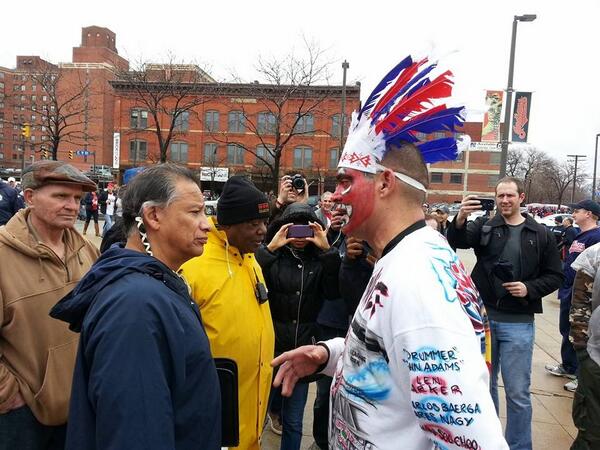
As an Asian American, and as a person who is dedicated to anti-racist activism, I am always at danger of focusing too much onto my own work; it is my duty to remember that I share a mutual goal with other people of colour in wanting to see an end to racism and racial discrimination in our world. And while our specific foci, angles and tactics might differ (as well it should), it is essential that we push back against our own tendencies to become too specialized, too factionalized and too isolated from one another. Instead we must reach out to one another, work together, form alliances and recognize our common goals. We must allow our individual efforts to integrate with one another rather than to interfere with one another; only by doing so can we hope to achieve a critical mass of anti-racist work that can challenge institutionalized racism and white supremacy.
That it took me this long to say something about #NotYourMascot is my fault, and for that I apologize.
#NotYourMascot is a common sense fight, one that by itself deserved primacy over the last two weeks; one that did not deserve to be distracted from. #NotYourMascot is a fight for anyone who wants to see the world less racist, a world where we don’t treat people of colour like mascots, where we respect Native people in particular and all people of colour, in general.
In short, #NotYourMascot is not just “a Native issue” and doesn’t deserve to be treated like one; #NotYourMascot is an issue that deserves full and vocal support from all of us — particularly every person of colour, as well as anyone else who has dedicated ourselves to challenging racism as it manifests around us.
And yes, that includes Asian Americans.
Act Now! Please take a minute to sign this petition demanding Dan Snyder change the name and mascot of the Washington R*dskins created by 18millionrising (@18millionrising) and check out the “central hub” post for our Week of Solidarity with #NotYourMascot for more writing to share and retweet, as well as other activism ideas.
* * *
Please note that, as an academic, I take a fairly libertarian position on the censorship of words, and do not believe in the complete banning of problematic words like ethnic slurs. This is because I believe that self- or outside-censorship is antithetical to critical academic dialogue, and that the academic discussion of ethnic slurs and their history (which includes this post) requires a conversation free of censorship; thus, typically I will spell out all ethnic slurs.
However, out of respect for this post’s inclusion in a Week of Solidarity blogging event with #NotYourMascot and the many Native writers involved in this campaign, I have elected to censor ethnic slurs targeting the Native community for this post.
